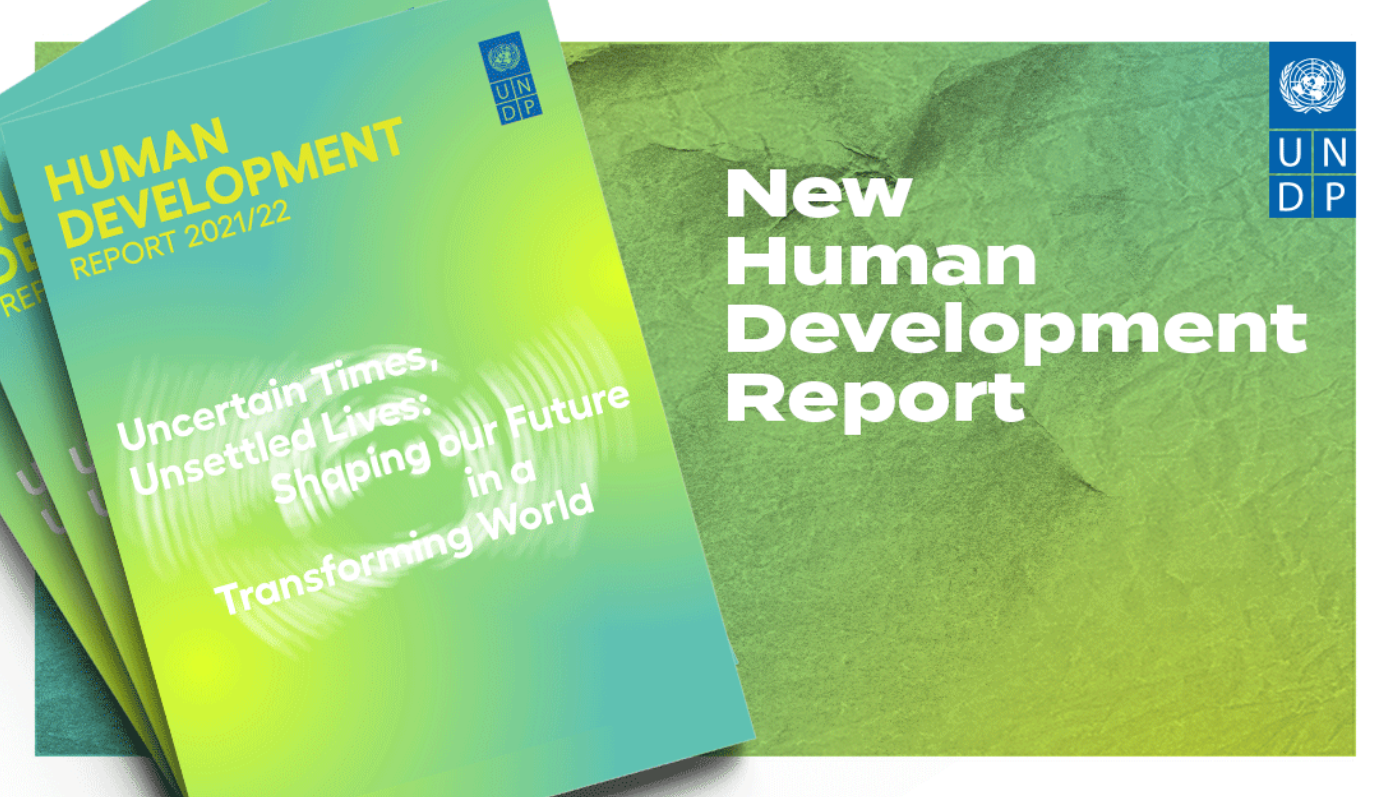Multiple crises halt progress as 9 out of 10 countries fall backwards in human development, says UNDP report
September 12, 2022

Human Development Report released by the United Nations Development Programme ranks Kyrgyzstan 118 out of 191 countries and territories on the Human Development Index. Unbalanced distribution of wellbeing led to a loss of 9.4 per cent, with income inequality contributing the most.
Bishkek, 8 September 2022 – the United Nations Development Programme has released its global annual Human Development Report (HDR) for 2021 including Human Development Index (HDI) measuring long-term national progress on health, education, and standard of living. The Report urges the world to jolt itself out of its global paralysis and secure the future of people and planet by re-booting its development trajectory and implementing sustainable solutions to prevent gender gaps, inequality, planetary pressures, and poverty.
The report titled “Uncertain Times, Unsettled Lives: Shaping our Future in a Transforming World” argues that layers of uncertainty are stacking up and interacting to unsettle life in unprecedented ways. Back-to-back crises like the COVID-19 pandemic and skyrocketing cost of living, interacting with sweeping social and economic shifts, dangerous planetary changes, and massive increases in polarization are putting pressure on systems, institutions, and beliefs that are inadequate to meet the challenges, and in some cases, cause greater harm to humanity in the long-run.
For the first time in the 32 years, the UNDP Human Development Index, which measures a nation’s health, education, and standard of living, has declined globally for two years in a row. Human development has fallen back to its 2016 levels, reversing much of the progress towards the Sustainable Development Goals. The reversal is nearly ubiquitous as over 90 percent of countries registered a decline in their HDI score in either 2020 or 2021, and more than 40 percent declined in both years, signaling that the crisis is still deepening for many. This extraordinary setback is negatively affecting almost the entire global population, including Kyrgyzstan, setting back human progress in life expectancy, education, and living standards.
“While growing inequality has been visible for a decade, this year’s Human Development Report illuminates how inequalities and uncertainty contribute to insecurity in a mutually reinforcing way. This compels countries to act with a sense of urgency to implement policies that are truly inclusive. That includes addressing basic human dignity and security, in particular universal access to income, livelihoods and fulfilment of fundamental human rights,” said Louise Chamberlain, Resident Representative of the UNDP Country Office in the Kyrgyz Republic.
The report also explores why the needed change is not happening, including how insecurity and polarization are feeding off each other, hindering the solidarity and collective action we need to tackle crises at all levels. Calculations show, for instance, that those feeling most insecure are also more likely to hold extreme political views.
To reverse the trend, the report argues, countries must redesign their paths to progress by fully accounting for the dangerous pressures that humans put on the planet and dismantling the gross imbalances of power and opportunity that prevent change for the better.
Technical Information
The Human Development Report covers six key composite indices of human development: the Human Development Index (HDI), the Inequality-Adjusted Human Development Index (IHDI), the Gender Development Index (GDI), the Gender Inequality Index (GII), the Multidimensional Poverty Index (MPI) and the Planetary pressure-adjusted Human Development Index (PHDI).
Kyrgyzstan’s 2021 HDI of 0.692 is above the average of 0.636 for countries in the medium human development group and below the average of 0.796 for countries in Europe and Central Asia. In the regional perspective, Kyrgyzstan HDI ranking of 118 is comparable with Tajikistan and Uzbekistan, which have rankings of 122 and 101, respectively. HDI of Kyrgyzstan increased in 2021 compared to the previous year (0.692 vs. 0.689), that allowed the country to gain its position in the ranking (118 in 2021 vs. 121 in 2020).
Between 1990 and 2021, Kyrgyzstan’s life expectancy at birth improved by 5.7 years, mean years of schooling changed by 2.2 years and expected years of schooling changed by 1.2 years. In the meantime, Kyrgyzstan’s gross national income (GNI) per capita declined by about 11.2 percent. During 1990-2021, the HDI value for the country grew by an average of 0.26% annually.
The Report also provides evidence on the extent to which multifaceted inequalities discounted the development progress in 2021. To this end, the HDI for the Kyrgyz Republic demonstrates that existing imbalances in distribution of wellbeing lead to a “loss” of 9.4 per cent of human development, with the income inequality contributing the most. This aligns with the wider Europe and Central Asia region pattern, where overall loss in human development due to inequality amounted to 10.3 per cent in 2021, though showing a more positive value when compared to the medium human development group (24.4 per cent).
From the gender perspective, gaps between females and males in achievements of human development (GDI) was estimated at 0.966 for the Kyrgyz Republic in 2021, with female HDI value of 0.675 in contrast with 0.698 for males. For instance, life expectancy at birth for women was 8.6 years higher compared to men, while men outperformed women by over 220 percent in terms of estimated gross national income per capita. The Gender Inequality Index (GII) showed that such inequalities in reproductive health, empowerment, and labor force participation between female and male population put Kyrgyzstan on the 87th place out of 170 countries by the scale of loss stemming from gender gaps.
In Kyrgyzstan, 20.5 percent of parliamentary seats are held by women, and 100 percent of adult women have reached at least a secondary level of education compared to 99.8 percent of their male counterparts. These indices show slightly improved results compared with the previous year (19.2% parliamentary seats were held by women and 99.1% adult women have secondary education). Since last year female participation in the labor market has decreased from 44.8 percent to 42.1 present and is still very low compared to 71.7 for men.
Kyrgyzstan’s persisting inequalities continue to create high rates of multidimensional poverty, which looks beyond income to understand how people experience poverty in multiple and simultaneous ways. It identifies how people are being left behind across three key dimensions: health, education and standards of living. People who experience deprivation in at least one third of these weighted indicators fall into the category of multidimensionally poor. During 2019-2021 in Kyrgyzstan, 0.4 percent of the population (25 thousand people) are multidimensionally poor while an additional 5.2 percent are classified as vulnerable to multidimensional poverty (330 thousand people). The breadth (intensity) of deprivation in Kyrgyzstan is 36.3%, which is the average deprivation score of people experiencing multidimensional poverty. Income poverty only tells part of the story. The multidimensional survey results also show that individuals living below the income poverty line may have access to non-income resources.
The report provides information on the Planetary pressure-adjusted Human Development Index (PHDI) for all countries, which adjusts the HDI or excessive human pressure on the planet. Negative value means that taking planetary pressure into account lowers a country’s rank on the HDI. Kyrgyzstan’s PHDI is 0.658. It is a very important index for Kyrgyzstan as for an extremely vulnerable to climate change country.
The data captured in HDR for 2021 reflecting changes caused by the COVID-19 pandemic and its socioeconomic fallout in 2020. The report has suggestions for how human development can help mankind navigate an uncertain future. Behaviors, institutions, policies all need to change simultaneously, and in the same direction.
To chart a new course, the report recommends implementing policies that focus on investment — from renewable energy to preparedness for pandemics, and insurance—including social protection— to prepare our societies for the ups and downs of an uncertain world. While innovation in its many forms— technological, economic, cultural—can also build capacities to respond to whatever challenges come next and help humanity finally break free of its constant cycle of crisis.
Contact for mass-media: Ainagul Abdrakhmanova, Communications Officer, tel +770 18343, e-mail: ainagul.abdrakhmanova@undp.org
To learn more about the 2022 Human Development Report and UNDP’s analysis on navigating the new uncertainty complex, visit HERE.

 Locations
Locations


